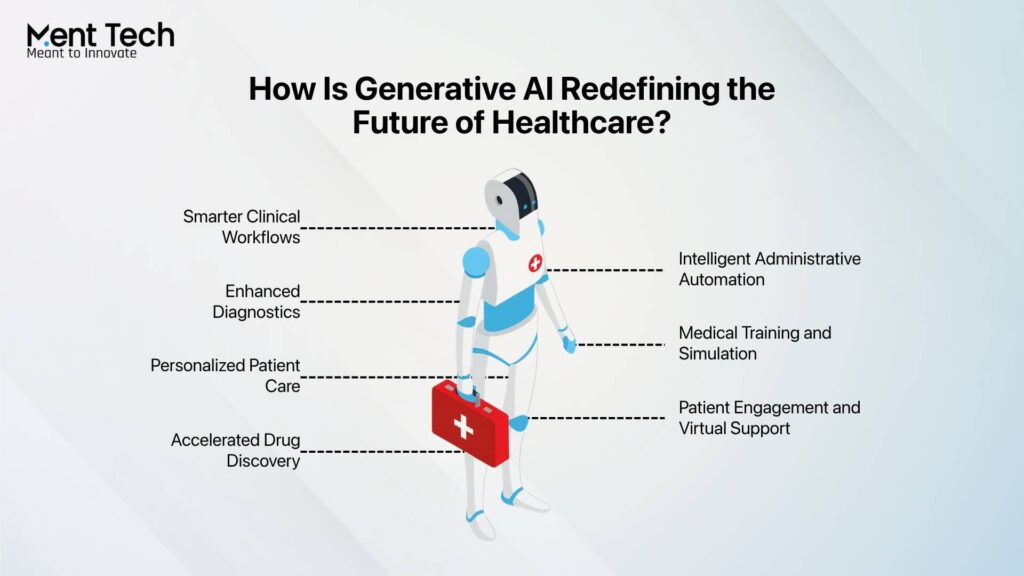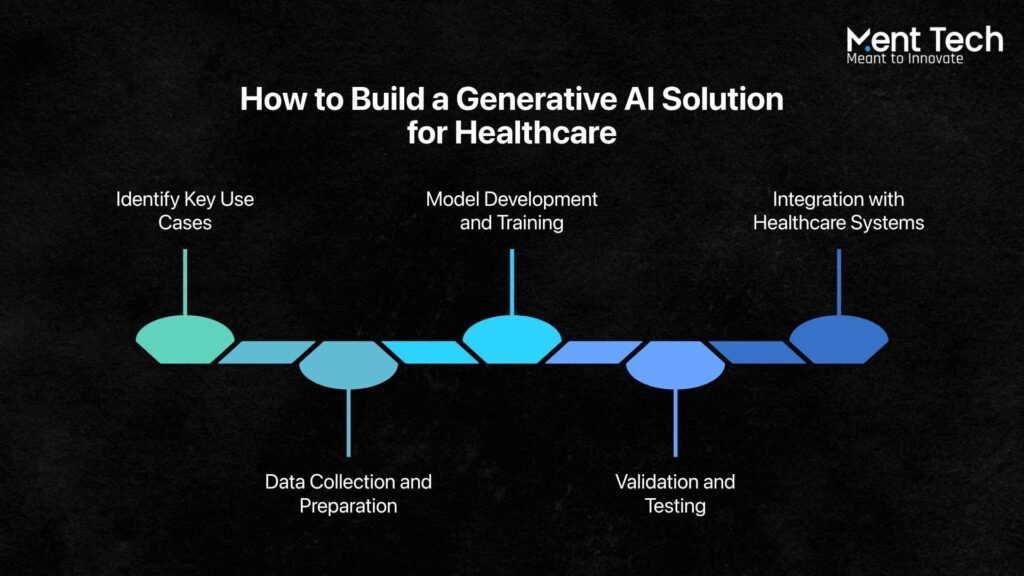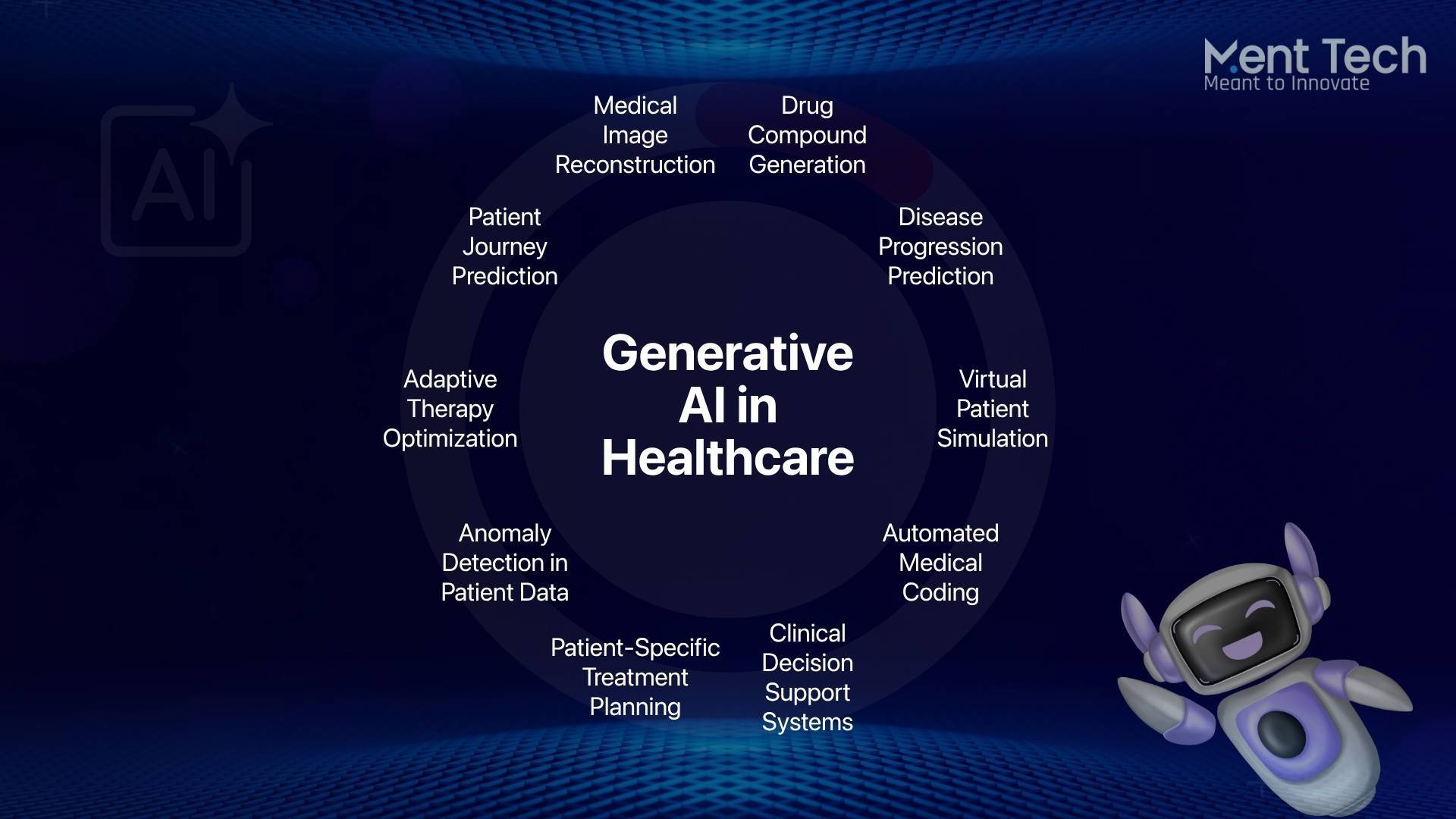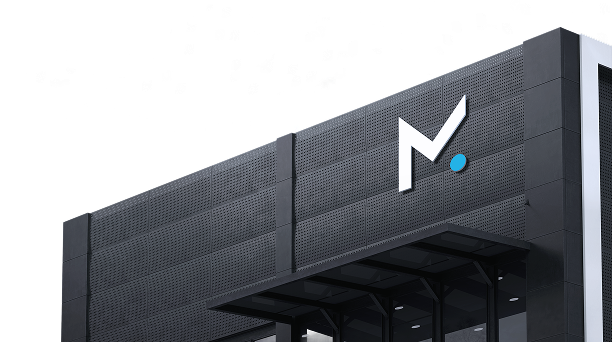Generative AI is rapidly transforming the U.S. healthcare landscape, helping startups and providers overcome rising costs, administrative complexity, and staff shortages. With annual healthcare spending exceeding $4.5 trillion, the need for efficiency has never been greater. By applying generative AI in healthcare, companies are automating documentation, enhancing diagnostics, and enabling more personalized care, while cutting operational costs by up to 17 times and improving accuracy and speed.
Building a scalable generative AI healthcare solution goes beyond simply deploying an algorithm. It requires a clear understanding of workflows, patient data privacy, and clinical objectives. From virtual assistants that reduce staff workload to synthetic data that accelerates research, AI healthcare startups are proving that intelligent automation can enhance both cost efficiency and patient experience when implemented strategically.
This blog examines how healthcare innovators utilize AI to enhance efficiency, reduce costs, and improve patient care. Discover how next-gen AI is reshaping healthcare delivery for better outcomes.
What is Generative AI in Healthcare?
Generative AI is redefining how the healthcare industry thinks about care, efficiency, and innovation. Unlike traditional AI that only analyzes existing data, Gen AI can create new insights, medical images, and treatment recommendations by learning from vast healthcare datasets.
This capability helps doctors and researchers predict risks, automate clinical documentation, and simulate patient outcomes with greater accuracy. As healthcare systems face mounting costs and staff shortages, Gen AI offers a smarter way to operate, freeing clinicians’ time, improving decision-making, and enabling more personalized, data-driven patient care.
“Generative AI has the potential to revolutionize healthcare by enhancing clinical decision-making, optimizing workflows, and improving patient outcomes.”
— Dr. Eric Topol, Founder & Director, Scripps Research Translational Institute
The Growing Cost Challenges in U.S. Healthcare
The U.S. healthcare system faces mounting costs from labor shortages, inefficiencies, and administrative overload. To stay sustainable, providers are turning to generative AI for smarter, cost-effective solutions.
1. Administrative Overload
Nearly 25% of U.S. healthcare costs go to administrative work like billing and claims processing. These manual, error-prone tasks waste valuable time, something generative AI in healthcare can automate to improve speed and accuracy.
2. Labor Shortages
With a shortage of 450,000 nurses and 80,000 physicians, hospitals face rising costs. AI startups bridge gaps through automation, virtual assistants, and Mental Health Support Bots for continuous patient care.
3. Outdated Systems
Inefficient legacy systems delay innovation and inflate R&D costs; bringing a single drug to market can exceed $2.6 billion. Generative AI healthcare applications can streamline research, data analysis, and diagnostics to cut waste.

4. Data Fragmentation
Healthcare data is often siloed across incompatible systems, driving duplication and cost. Integrating generative AI for healthcare helps unify records and unlock actionable insights for better coordination.
5. Rising Patient Expectations
Modern patients expect fast, digital-first, and personalized care. AI voice assistance and healthcare generative AI tools enable smarter engagement and tailored experiences, improving satisfaction while reducing overhead.
Traditional AI vs Generative AI in Healthcare
| Aspect | Traditional AI | Generative AI |
| Learning Approach | Relies on pre-programmed rules and fixed algorithms. | Learns from vast amounts of healthcare data to recognize patterns and generate new insights |
| Functionality | Operates strictly within defined boundaries and programmed logic. | Capable of creating novel solutions in areas like drug discovery and personalized medicine. |
| Transparency | Easier to interpret and understand due to rule-based decision-making. | Complex neural networks make it harder to trace the reasoning behind outputs. |
| Use Cases | Excels in repetitive, data-driven tasks such as medical image analysis or anomaly detection. | Drives innovation through predictive modeling, molecule design, and treatment personalization. |
| Impact on Healthcare | Enhances efficiency and accuracy in routine medical tasks. | Capable of creating novel solutions in areas like drug discovery and personalized medicine. |
How Is Generative AI Redefining the Future of Healthcare?

Generative AI is revolutionizing healthcare by improving diagnostics, accelerating research, and personalizing treatment plans. It’s driving a new era of smarter, faster, and more efficient care delivery across the entire healthcare ecosystem.
• Smarter Clinical Workflows
Generative AI automates tasks like documentation and EHR updates, letting doctors focus on patient care. It speeds up workflows and reduces administrative fatigue.
• Enhanced Diagnostics
AI models analyze medical images to detect diseases with high accuracy, enabling faster diagnosis and improved patient outcomes.
• Personalized Patient Care
By analyzing genetic and lifestyle data, AI creates individualized treatment plans that boost effectiveness and reduce side effects, bringing true personalization to healthcare delivery.
• Accelerated Drug Discovery
Generative AI simulates molecular interactions and predicts drug behavior, reducing R&D time and costs significantly, helping life-saving treatments reach patients faster.
• Intelligent Administrative Automation
AI streamlines billing, scheduling, and data entry, cutting manual errors and operational costs. Healthcare providers save resources while boosting efficiency and accuracy.
• Medical Training and Simulation
Generative AI builds realistic virtual training scenarios and synthetic data for safer, hands-on medical learning, empowering professionals to train effectively without real-world risks.
• Patient Engagement and Virtual Support
AI chatbots, virtual assistants, and Meditation & Mindfulness Assistants provide 24/7 guidance, reminders, and emotional support, enhancing patient care while reducing staff workload.
Real-World Applications of Generative AI in Healthcare
Generative AI is transforming healthcare by bridging the gap between innovation and patient outcomes, a shift that even a Healthcare SEO Company closely analyzes to understand emerging patient-centric trends. From accelerating drug discovery to improving diagnostic precision, leading organizations are adopting AI to enhance research, streamline workflows, and enable personalized medicine at scale.
NVIDIA
NVIDIA’s healthcare AI solutions accelerate drug discovery and medical imaging analysis. Its advanced platforms help hospitals and research labs process massive datasets, simulate molecular interactions, and enable predictive analytics for faster, more efficient medical innovation.
Pfizer
Pfizer leverages AI to streamline the entire drug development process from molecule identification to regulatory documentation. Using AI-driven predictive modeling, the company reduces R&D time and costs while bringing life-saving treatments to market more quickly.
How to Build a Generative AI Solution for Healthcare?

Creating a powerful generative AI solution in healthcare takes more than just technology; it demands strategy, precision, and deep industry expertise. Here’s a clear roadmap that healthcare organizations can follow to bring AI innovation to life:
1. Identify Key Use Cases
Start by identifying critical pain points, whether it’s automating medical documentation, optimizing workflows, or accelerating drug discovery. The right use case ensures measurable value and faster ROI.
2. Data Collection and Preparation
Gather diverse, high-quality clinical data while maintaining compliance with healthcare privacy standards. Structured and anonymized datasets are the foundation for effective AI model training.
3. Model Development and Training
Build and train models using domain-specific datasets to ensure accuracy and reliability in real-world healthcare scenarios. Continuous refinement helps align outcomes with clinical goals.
4. Validation and Testing
Thoroughly validate the model for accuracy, bias, and performance before deployment. Rigorous testing ensures that AI-driven recommendations are both safe and clinically sound.
5. Integration with Healthcare Systems
Through Generative AI integration services, seamlessly connect AI models with existing systems like EHRs, diagnostic tools, or telehealth platforms to enhance decision-making and operational efficiency.
Final Thoughts
Generative AI is more than a technological breakthrough. It’s transforming how healthcare diagnoses, treats, and cares for patients. Merging data intelligence with human insight enables faster decisions, personalized treatment plans, and predictive healthcare models that save time, cost, and lives.
Ment Tech, a leading Generative AI Development Company, empowers healthcare organizations to integrate AI responsibly and effectively. From LLM-powered diagnostics to adaptive AI systems, we help you design, deploy, and scale solutions that enhance accuracy and efficiency across every stage of patient care.
Reimagine the future of healthcare with innovation that truly heals. Partner with Ment Tech and hire AI developers to build intelligent, data-driven solutions that redefine patient outcomes and shape a smarter, healthier tomorrow.
Frequently Asked Questions:
Generative AI is helping hospitals and research institutions automate documentation, analyze complex medical data, and enhance diagnostics. By integrating AI Development into healthcare workflows, providers can make faster, data-driven decisions while improving patient care and operational efficiency.
From drug discovery and medical imaging to predictive analytics, generative AI is driving innovation across healthcare. Through Generative AI Consulting services, hospitals can streamline processes, create synthetic datasets, and enhance precision in diagnosis and treatment.
AI-powered systems analyze medical images and reports to identify diseases at early stages with remarkable precision. These tools support clinicians in making faster, more accurate diagnoses, improving patient outcomes, and optimizing care pathways.
Adaptive AI continuously learns from new data, helping healthcare systems evolve with changing patient needs and emerging trends. This adaptability ensures better resource allocation, enhanced decision-making, and more personalized care delivery.
While generative AI offers immense potential, organizations must address challenges such as data privacy, model bias, and regulatory compliance. Partnering with experienced AI consultants helps mitigate these risks while ensuring responsible, scalable AI deployment.


